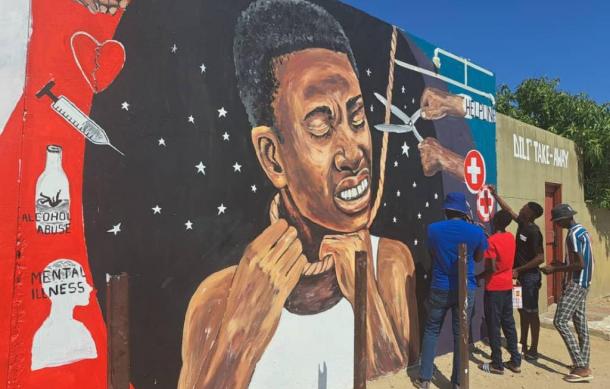
A visual artist is using his talent to raise awareness about suicide in Rundu.
Paulus Kanyanga believes that his "Suicide Mural Project" will encourage more Namibians to open up about the realities behind the act.
Titled "Only in the Darkness Can You See the Stars," this piece of art depicts a reality that many Namibians are currently facing.
The mural is dedicated to those who have committed suicide as well as loved ones who have attempted to take their own lives.
The self-taught visual artist says creativity is a powerful way to spread a message, especially about suicide not being the only option during times of difficulty.
"No one lives a perfect life. Sometimes, things happen to make you strong, so don't give up. On earth, there is only one life. If you end that life, you will never get it again."
Apart from the artwork depicting the obvious, which is a man attempting to hang himself, it also gives clarity on some of the causes, like poverty and unemployment, alcohol and drug abuse, heartbreak, having a disability, and mental health-related issues.
The mural is on display in Safari, just a stone's throw away from the Tandaveka Open Market.
A local homeowner permitted Kanyanga to paint on his wall, all in the hope of getting the suicide conversation going.
"I did not expect some people who even tried to commit suicide; they were here, anonymous people; they explained themselves. They felt free. Some came thinking we were putting up an office. That's when I told them, No, we are only trying to give a message where you can go."
The mural also depicts safe places for those with suicidal thoughts, and once the artwork is complete, there will be a lifeline where people can call for assistance.
Paulus Kanyanga received a grant of N$7,500 from the National Arts Council of Namibia for the project.
The National Arts Council says painting murals is a form of therapy and a way to give back to the community.
According to Nampol, a total of 1,542 Namibians took their own lives between April 1, 2020, and March 31, 2023, and 80% were men.





